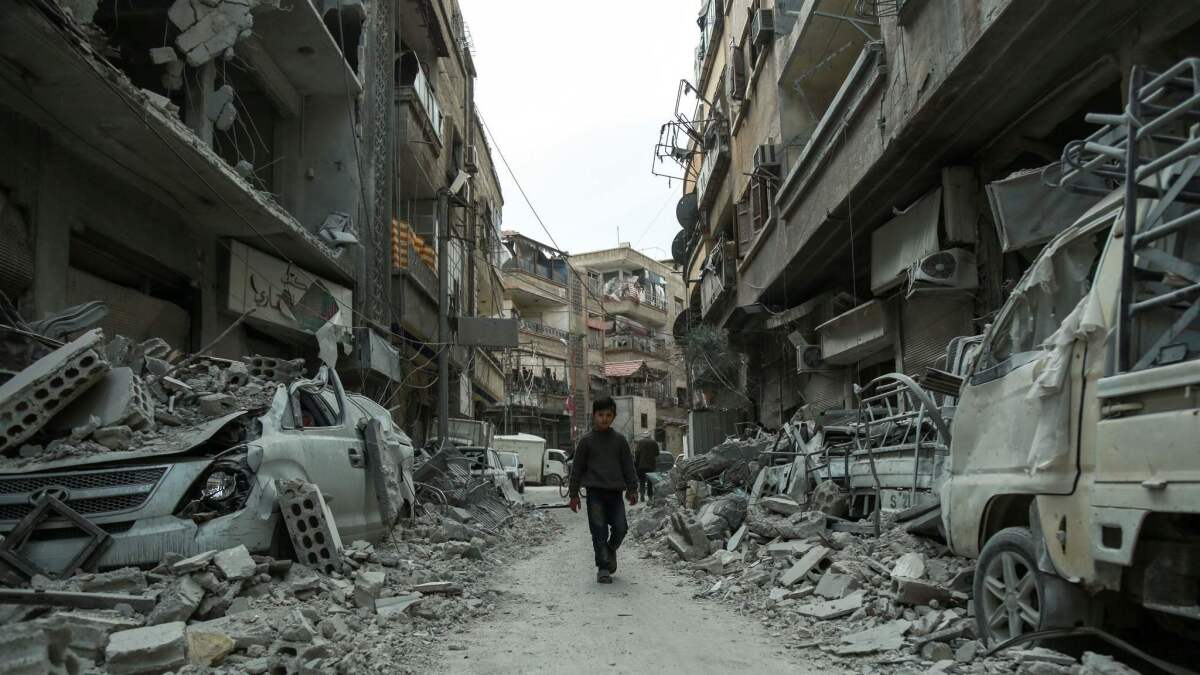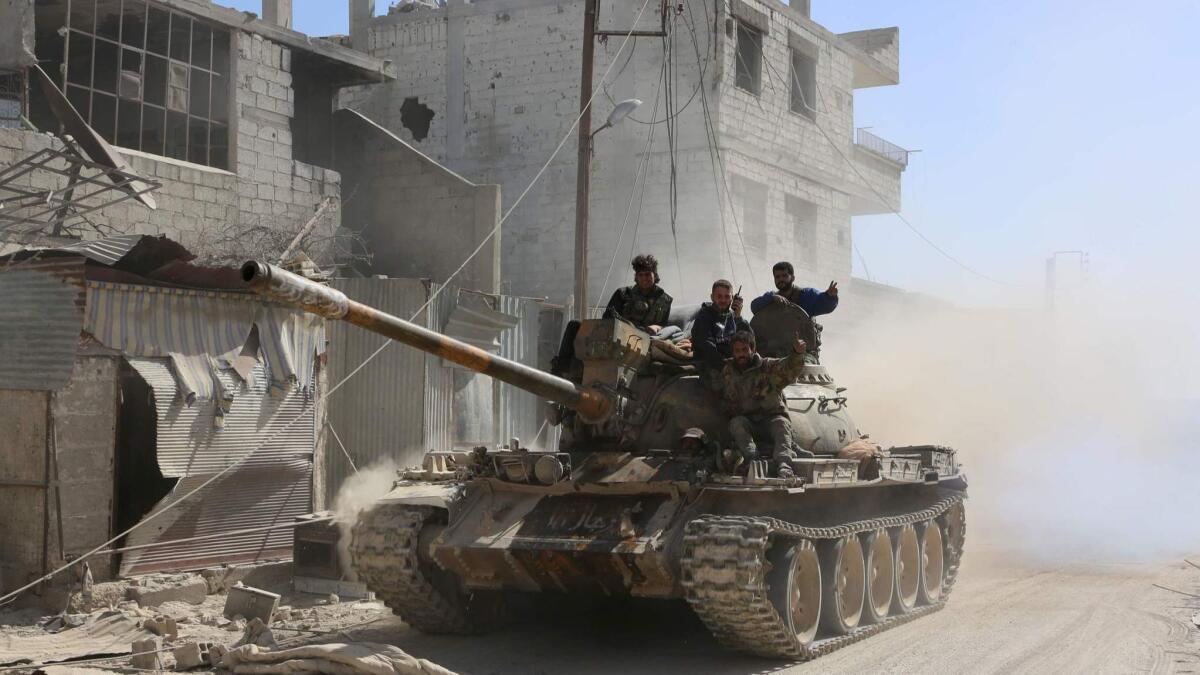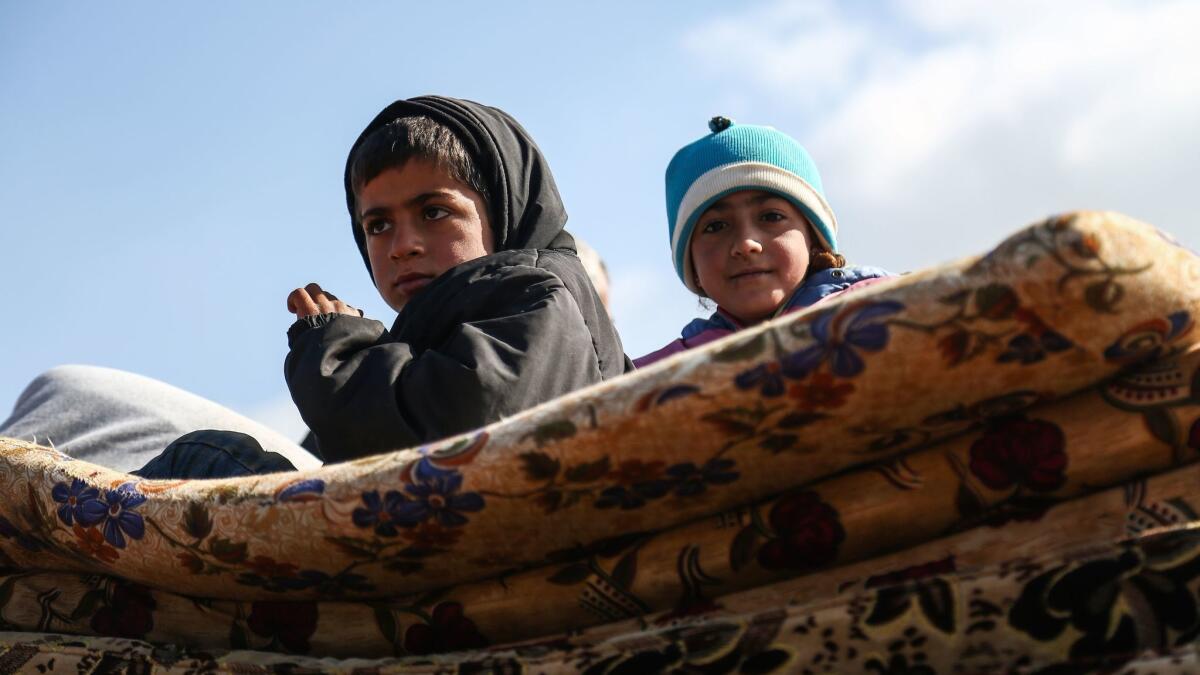Seven years on in Syria: Nobody seems willing to stop the bloodshed

- Share via
Reporting from BEIRUT — Slightly more than four years ago, Stephen Hawking, the famed physicist who died Wednesday, described what was happening in Syria as “an abomination, one that the world is watching coldly from a distance.”
It was finally time, he wrote, to say “no more.”
Yet more is what has come to Syria, which has become an emblem of man-made misery in a conflict that marked its seventh anniversary Thursday.
The crisis, which began as part of the “Arab Spring” uprisings, disintegrated into a hellish civil war that has killed hundreds of thousands. The United Nations gave up tracking the numbers years ago, though some war monitors say roughly 500,000 people have been killed.
Hundreds of thousands more have been wounded, and more than half the country’s prewar population of 22 million has been displaced, igniting a refugee crisis that has hardened anti-immigrant sentiments across Europe. Some of the country’s most historic cities and sites have been pummeled into wastelands of jagged masonry and rusted rebar — the detritus of lives destroyed in campaigns where siege tactics and indiscriminate attacks have become the norm.
In ways, the conflict has redefined what is permissible in wartime.
It has also become an internecine proxy war that has reshaped alliances and helped reopen the doors to the Cold War era. And it has come at the expense of the people all sides claim to want to protect.
“The Syrian conflict has shown the moral bankruptcy and cowardice of the international community. It has exposed the incompetence of the Security Council and the U.N.,” said Fawaz Gerges, a Middle East expert at the London School of Economics, in a phone interview Wednesday.

“Syria now has become a battleground for regional and global powers, who are basically trying to grab as much territory as possible in order to maximize their interest,” he said.
Of the latest wave of cease-fires, one, Resolution 2401, was unanimously voted into place by the United Nations Security Council in February. A few days later, it was followed by a daily truce ordered by Russian President Vladimir Putin, the top ally of Syrian President Bashar Assad.
They were broken almost before they began.
In Afrin, a Kurdish-dominated enclave in the country’s northwest, Turkish troops working alongside Syrian rebels all but ignored the cease-fire and pressed their campaign (euphemistically called Operation Olive Branch) to dislodge the U.S.-allied militias that Ankara views as a proxy for a Kurdish separatist movement in its own territory. More than 200 people have been killed, according to Syrian Observatory for Human Rights, a pro-opposition monitor based in Britain.
In east Ghouta, a network of suburbs near Damascus and home to an estimated 350,000 people, the weeks-long assault on the rebels there continued unabated despite widespread condemnation by world powers.
The rebel-held enclave has endured the full gamut of the war’s horrors. In 2013, it was the site of a deadly sarin gas attack that killed hundreds and the target of a years-long government siege.
But that has been eclipsed by the no-holds barred assault this year that has forced residents to seek shelter underground, where they pack by the hundreds in basements to escape the rain of mortar shells, artillery and bombs. The number of dead surpassed 1,000 people this week, as loyalist troops clawed back chunks of rebel-held areas and uprooted thousands.
Elsewhere in the country, the armies of three countries — the U.S., Russia and Turkey — and the special forces of a few more share a battleground with hundreds of rebel and militant factions fighting pro-government, Iranian-backed militias.
In between them stands the U.N., “which has been taken hostage” as it scrambles to balance the interests of member nations, said Lakhdar Brahimi, a veteran diplomat and former special envoy to Syria.
“During the Cold War, the U.N. was paralyzed because of the disagreements between the major powers,” Brahimi said Wednesday. “As far as I’m concerned we’re back with the conditions of the Cold War, and the U.N. finds it more and more difficult to act.”
Even when aid is delivered, the U.N. as well as other aid groups are criticized for favoring one side over another, said Ali Zaatari, the U.N.’s humanitarian coordinator for the country.
“We have a problem in that all parties want us, as humanitarians working in Syria, to absorb and accept their view of the conflict in a bid to draw legitimacy.”
And the fighting has raged on, said Joshua Landis, director of the University of Oklahoma’s Center for Middle East Studies, in full view of the world.
“Syria has engaged a great deal of the world’s attention in the last seven years,” Landis said. “The problem is that no one really cares about Syria the country, it’s that they care about the geographic position of Syria and they want leverage.
“They care about Syria, but not the Syrian people.”
For many Syrians, the different sides fade into irrelevance when stacked against the horrific toll of the war.

“We believe that the Ghouta is precious for you,” Ward Mardini, a pro-opposition activist in the area, wrote to the rebel commanders in Ghouta on her Facebook page. “But we’re tired and the situation demands a realistic solution that stanches the waterfall of blood.”
Yet no side seems willing to stop.
Through its Kurdish allies, the U.S. controls about 30% of Syria, which it views as a necessary buffer against an Iranian-led power crescent stretching from Tehran to Beirut. Assad’s government, which has shown no interest in negotiations, still vows to reclaim all of Syria.
The biggest winners are perhaps Iran and Russia; their support for Damascus, credited for having kept Assad in power and turning the tide of the war in his favor, means they will lead the charge in a reconstruction bonanza that will require an estimated $250 billion. Iranian and Russian firms have already netted electricity, gas and oil contracts.
But even that has become another battlefield; part of a strategy, Landis said, where “no one is allowed to win.”
“That has been the guiding thread over the last seven years,” he said.
“No one has cared enough to win, but nobody wants to lose.”
Bulos is a special correspondent.
Twitter: @nabihbulos
More to Read
Sign up for Essential California
The most important California stories and recommendations in your inbox every morning.
You may occasionally receive promotional content from the Los Angeles Times.














